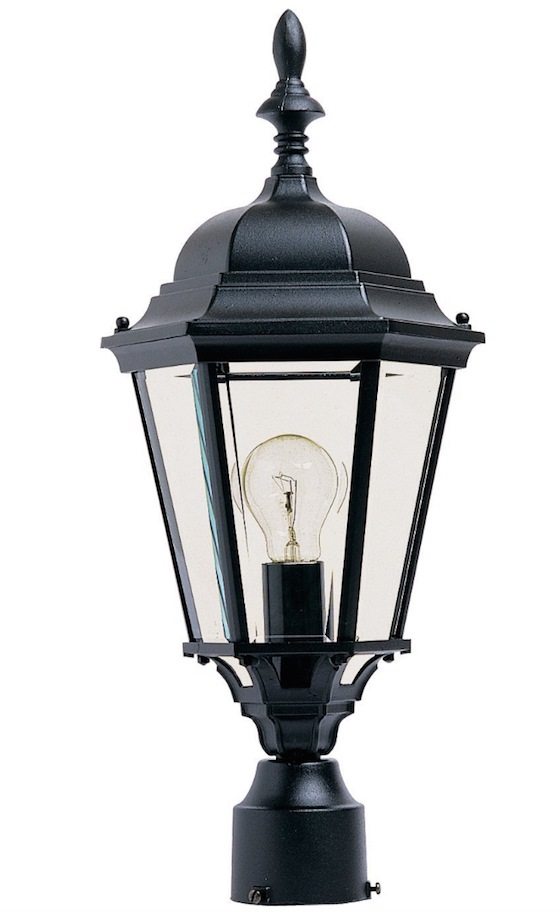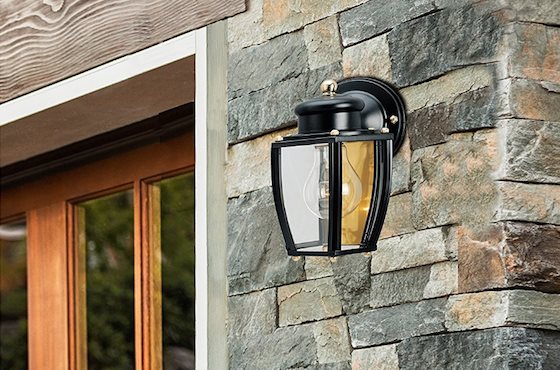Outdoor Lighting Tips
Outdoor Lighting Tips
Outdoor lighting is a huge topic.
Think of all the different types of outdoor lights you could have:
- post lamp at driveway
- porch lights
- spot lights
- low-voltage patio or deck lighting
- landscape highlight lighting
- Christmas or other seasonal holiday lighting
A book could be written about each of those areas there's so much to cover.
Free & Fast Bids
Post Lamps
Post lamps are very handy. They can help guide people to your home when it's dark outside.
Consider getting one that incorporates a powered outlet to it so you can add extra Christmas lights to decorate the post lamp.

This is but one of HUNDREDS of different outdoor post lights. Every style, finish, etc. is available. CLICK THE PHOTO NOW TO SEE ALL OF THEM AND HAVE ONE AT YOUR HOME NEXT WEEK.
Porch Lights
You can get wall-mounted sconces or if you have a covered porch, you can install a light or two in the ceiling.
These same fixtures work well beside a garage door or on a shed.
If your front door is distinctive and you have a grand entrance, it's usually best to put a light on each side of the door.

Here's a wall sconce fixture next to a garage door. It would work next to any door. There are HUNDREDS of styles and finishes. CLICK THE PHOTO NOW TO SEE THEM ALL AND HAVE ONE OR MORE DELIVERED TO YOUR HOME NEXT WEEK.
Spot Lights
These are handy lights that work like the lights at an outdoor football or baseball field. They're designed to illuminate a LARGE area.
You can use them for security or you can use them to play sports outside your home at night.
I love the newer ones that have motion detection, a built-in video camera, a speaker and an alarm! You can TALK to people that are walking outside your home no matter if you're inside or 3,000 miles away as the video and audio portion work through the Internet and your smart phone.
Low-Voltage Patio or Deck Lights
While many of these are advertised as DIY friendly, they're not.
There's much to understand about how these systems work and how to run the direct-current cables so you don't overload the network you've set up.
If you're a serious DIYr, then you may have good luck. Start with a small project and cut your teeth on that before starting a massive project.
If you're doing a giant install around a new patio, you'll want to plan ahead and install underground conduits to make installing the lights so much easier.
Landscape Up Lighting
While the use of up lighting to highlight trees in your yard is dramatic, it adds to light pollution in the area and it could upset your neighbors.
I urge you to read up on the Dark Skies project and be sensitive to outdoor lighting and how it affects others before you embark on some massive up-lighting project at your home.
Seasonal Outdoor Lighting
If you make a habit of installing outdoor seasonal lighting of any type, you might consider installing several strategically located outdoor receptacles which are controlled by an indoor switch.
Many people struggle with extension cords which have to be draped through windows or doors. These cords have to be plugged in and out each night. The indoor switch makes the job easier and safer. Extension cords are major sources of electrocution and fires. Avoid using them at any expense.
With a little extra effort, these outdoor receptacles can be wired in such a fashion that one socket is hot all of the time. In other words, it operates independently of the switch.
This is often referred to as a split receptacle. This way, if you want to plug in a hedge trimmer, or any other electrical appliance when the lights are not in use, you will not have to go indoors to turn on the switch. It is easy to do. It just takes a little preplanning.
Lightning Arrestors
Consider installing a lightening arrestor in your main electrical panel. These devices have the ability to capture massive voltage surges that enter your service entrance cables which power your entire house.
The devices, when installed with a first class grounding system, bleed the voltage surge to the ground. These devices must be used in conjunction with point of use surge protectors that are commonly sold with sensitive electronic equipment in order to provide the highest level of protection for electronic equipment.
These devices can be installed by a homeowner who is familiar with service panel wiring. Do not install these devices unless you are 100 percent positive you know what you are doing. If installed improperly, they are ineffective.
GFCI's (Ground Fault Circuit Interrupters)
These devices are highly sensitive circuit breakers which can protect you from electrocution hazards. They can sense extremely small current leakages across the circuit long before you would begin to be electrocuted.
The National Electric Code continues each year to expand the locations where these devices should be used. Generally speaking, any location where water is likely to be present with an electrical device is a candidate.
Bathrooms, kitchens, basements, garages, outdoor receptacles, swimming pools, etc. are examples. They are inexpensive and they work. Don't hesitate to install them in as many locations as you can afford.
These devices are manufactured so that you can protect several outlets that are downstream from the GFCI. This makes it possible to protect different locations with one device.
These devices can be installed by an amateur with success. Simply follow the directions carefully and all should go well. Consider installing them today, as they can be lifesavers!
Related Terms: electricity literature, circuit breakers, more on circuit breakers
Column B48